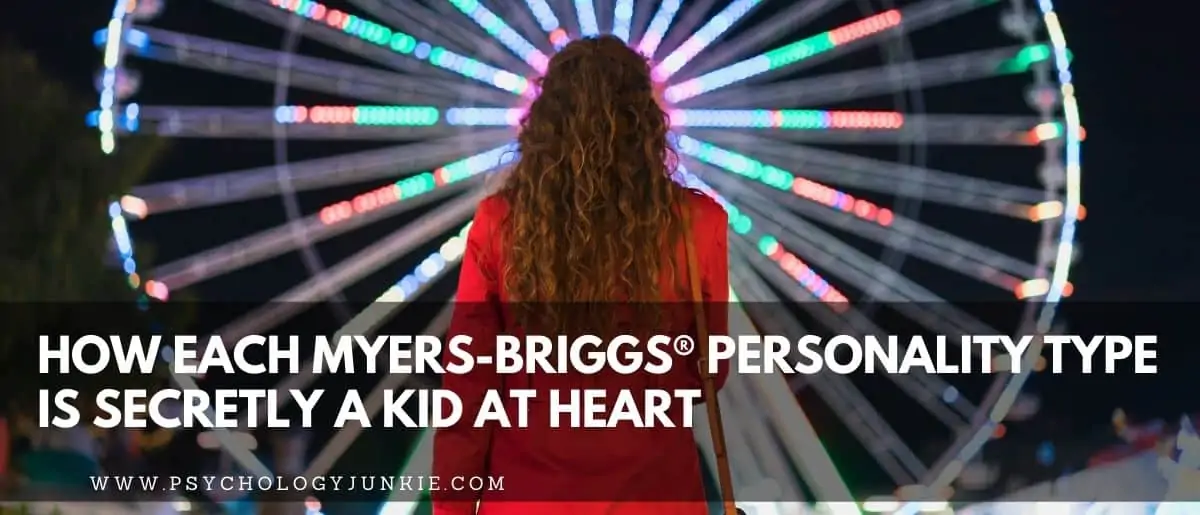How Each Myers-Briggs® Personality Type is Secretly a Kid at Heart
Table of contents
Estimated reading time: 26 minutes
The ENFP
The bright and endless imagination of childhood doesn’t simply disappear because ENFPs have suddenly hit mid-life. As ENFP Walt Disney said, “Everybody in the world was once a child. We grow up our personalities change. But in every one of us something remains of our childhood.”

For the ENFP, life is all about possibilities and dreams and playfulness and imagination. These are all qualities that children share, and things only the wisest of adults remember. Most ENFPs feel no shame about their childlike wonder, but some have been mocked or patronized for it and so try to hide it behind a more serious demeanor. Yet even for these ENFPs, in the quiet and uninterrupted moments, their mind comes alive with possibilities and daydreams.
How to Honor Your Inner Child:
- Give yourself time to dream
- Don’t brush away or ignore your playful side. It’s a blessing not a curse!
- Spend time with like-minded individuals
- Travel and see new things (even in your hometown) to furnish your imagination
- Read books that give you more imaginative material
- Be a lifelong learner and constantly find new areas for your curiosity to develop
- Spend time in nature and unplugged from distracting devices
- Believe in yourself! Even if it’s just a little bit more each day
Read This Next: 10 Must-Read Books for ENFPs
The ENTP
Like a child tapping their fingers impatiently on a school desk, ENTPs can sometimes seem restless and easily distracted. They’re always making new connections and thinking about possibilities and mentally collecting ideas and information that they can use to test their own theories. For the ENTP, there’s nothing wrong with this; it’s how they learn and explore and discover things for themselves. Yet in the serious, no-nonsense, 9-5 workplace ENTPs can seem more lively, curious, and anti-authoritarian than the typical adult. They don’t mind questioning norms and accomplishing tasks in their own way – even if it means breaking a few rules in the process. For people who appreciate their non-conventional nature (and original solutions), this curiosity and ingenuity are appreciated. For by-the-book types, ENTPs can be seen as irreverent or irresponsible.
The truth is, ENTPs need to be able to wander the playground of innovation, creativity, and curiosity. When they’re in a work environment that allows them to do this, their childlike curiosity and excitement shine through and allow them to take their projects leaps and bounds into the future.
How to Honor Your Inner Child:
- Don’t neglect your ideas, feelings, and imagination! These are the foundation of who you are – an inventive dreamer and theorist. Let yourself explore new things without judgment or fear
- Be careful not to take on too many responsibilities at once – you’ll lose some of your spark and imagination
- Balance structured, responsible time with momentary spurts of play, research, discussion, or activity.
- If your need for creativity and innovation isn’t being met in your current job, consider doing freelance or entrepreneurial work!
Read This Next: 10 Must-Read Books for ENTPs
The INFP
One of the most imaginative of the types, INFPs hold a childlike wonder for the world beyond the senses. One moment they can be serious and intense, fixated on something that deeply matters to them on a personal level. The next moment they can be playful and fun; dreaming of magical worlds, fantastical possibilities, and stretching the boundaries of what’s seemingly possible.
In their playfulness, INFPs often have a natural empathy and connection with children. They’ll find themselves drawn to playing with kids or sharing their imagination with them. They might even be known for having childish hobbies like collecting odd items or reading their favorite children’s stories over again even into adulthood. Like children, they can become silly and excited for almost no reason – but this is often only done when they know they’re among friends who won’t judge this side of them.
It’s crucial for INFPs to get time and space in their life to explore who they are and what childlike parts of themselves have been suppressed or ignored. When they give this part of themselves the freedom it needs, they find curiosity, creativity, and ingenuity waiting there for them to develop.
How to Honor Your Inner Child:
- Do something you enjoyed as a kid and don’t judge yourself for it!
- Speak to yourself compassionately. Would you be as hard on yourself if you were speaking to 7-year-old you?
- Allow yourself to wonder about the world and what’s possible – it’s important for your well-being
- Read plenty of fiction novels to furnish your imagination with beautiful scenes and possibilities
- Write about what the child inside you wants and needs in life. Take a sheet of paper and write about what 9-year-old you needs in life. Are there parts of yourself or needs that you’ve been ignoring? Maybe you need to jump in some leaves, build a snowman, or watch your favorite childhood movie!
Read This Next: 26 Memes INFPs Will Instantly Relate To
The INTP
Most people think of the stereotypical bookworm when imagining an INTP. But they can also be very childlike; remembering their own childhood as a time of wonder and fascination with the world around them. They might even feel sadness at all the years spent away from this state of inner-child or observation, wishing they could somehow return to it.
This childlike quality is something the INTP might not be aware of. They’re curious about how things work and why. Just like children who follow their parents around asking “How does an iPhone play music?” or “Why does it snow in the winter?” INTPs feel an incessant need to ask questions and ponder the “Why’s” of life. However, as they get older they direct most of their questions towards libraries, internet searches, or even Reddit threads rather than busy parents.
And the INTP’s curiosity doesn’t extend only to facts and knowledge; it extends to the imaginative world as well. They get a thrill from watching movies that bend or combine the boundaries of fantasy and reality. They might even become absorbed in a story that takes them to faraway, magical lands.
INTPs can make excellent teachers and tutors because of their curiosity and need to satisfy it. If they are able to nourish their curiosity and imagination, they can often find a connection with younger children. They might even surprise themselves at their ability to remember details from classic children’s books or movies that have been long forgotten by most other adults.
How to Honor Your Inner Child:
- Give yourself a little reading time each day to feed your need for knowledge.
- Listen to audiobooks while you do mundane tasks to brighten up otherwise dull moments!
- Play video games!
- Build or create something from nothing – use LEGOs or recyclable materials you have around the house!
- Make a list of things that brought you joy as a child and revisit them!
- Be mindful of your inner critic. When you find yourself connecting with your inner child’s feelings and dreams, you might feel self-critical, silly, or immature. Don’t suppress this voice, but allow your inner child’s voice to be heard as well. Acknowledge both sides of your personality: The critical adult and the playful, more vulnerable child.
Read This Next: 12 Fictional Characters You’ll Relate to if You’re an INTP
The ENFJ
ENFJs often appear charismatic and driven on the outside, but on the inside, they have a childlike desire to see the best in people. Idealists at heart, they want to create a world of harmony, understanding, and peace. Many adults have let cynicism cloud over that idealistic child-like side, but most ENFJs have not. Often no matter what hardships they have faced, they can’t stop believing that they can make a difference.
Some people consider ENFJs impractical because of their idealistic views of the world, but that perspective is ignorant. ENFJs are highly attuned to human potential, and their hearts yearn to understand where other people are coming from – no matter how messy their lives may be. They have a knack for inspiring people to reach for higher goals and be better versions of themselves. Their warm, empathetic nature can help people divulge their pain and find healing in the end. This is likely why many ENFJs are drawn to careers in counseling (MBTI® Manual – Third Edition).
Moving away from idealism, another aspect of ENFJs that can seem childlike is their thirst for adventure. They are often enthusiastic about exploring new places, trying new foods, or taking on recreational challenges. There’s intense energy and enthusiasm that bubbles up when they’re around people, and this in itself can seem childlike and playful.
How to Honor Your Inner Child:
- Recall the places you remember as a child that inspired you to be creative. Go back there – even if it’s just in your imagination!
- What activities did you enjoy most as a kid? Try them now with friends, family members, or people who are new to these hobbies!
- Don’t be afraid to be silly!
- Try to take on challenges. Give yourself the chance to do something you might have always wanted to try, but are scared of doing. For example, go skydiving or have a scary movie marathon.
- Write a letter to the childhood version of yourself. Acknowledge that child and consider what things that child would want for you now. Maybe that childlike version of you would want you to laugh more, go outside more, put the phone down more, or cut yourself more slack!
The ENTJ
ENTJs are typically hard-working and rational. They are usually driven to succeed and to make the most of every bit of time they’re given. At the same time, they are not completely devoid of childlike wonder and playfulness. They tend to crave experiences that challenge them intellectually or physically. Their competitive nature and desire to be the best can make games of Monopoly or Settlers of Catan lively adventures!
ENTJs also have a curiosity about the world beyond the senses. As intuitives, they ask far-reaching questions and don’t mind delving into concepts that many other adults have grown tired of trying to understand. This sense of inquiry and fascination with the unseen might also inspire them to study metaphysical or philosophical concepts such as existentialism or the nature of being.
At first glance, ENTJs may seem to take their goals and themselves very seriously. But when you know them better, it’s easy to see that they enjoy the humor in daily life. They often appreciate partners who can make absurdist jokes and poke fun at things that other people take too seriously.
How to Honor Your Inner Child:
- Play a game of tag with your kids!
- Read a book that makes you think differently about the world we live in. For example, Siddhartha by Herman Hesse is about an Indian man’s search for meaning and enlightenment. It might challenge what you believe or inspire you to think about the world we live in differently.
- Listen to a playlist of songs you loved as a child or teen and pay attention to what feelings the music evokes.
- Think of what your 9-year-old self would say to you when they looked at your life today. Would they congratulate you and thank you for living your dreams? Would they tell you not to be so hard on yourself? Would they urge you to get outside and play more?
The INFJ
INFJs are quiet, empathetic idealists who want to change the world for the better. They often have a strong connection to childhood ideas of being an “old soul” or having been born in the wrong era. Feeling “out of place in time” is something many INFJs will relate to. They may miss times long ago they never even lived in or find themselves lost in thought about the future and what it will look like in vivid detail.
While INFJs may not have the outward playfulness that many associate with childlike behavior, they have an inner world that often feels like a child’s wonderland. They tend to be highly imaginative and creative, but it often takes being alone for that inner world to come alive. Spending time in nature, listening to music alone, or just laying in bed daydreaming can all make their imagination surge with possibilities.
INFJs can also have a playful and offbeat sense of humor that they tend to save for those closest to them. They may surprise people who don’t know them well by cracking the perfectly timed joke or making some dark, irreverent comment when someone least expects it. Often humor is used by INFJs as a way to put other people at ease or make the atmosphere less oppressive or tense.
How to Honor Your Inner Child:
- Lay down in the grass and watch the clouds float by.
- Take a walk in nature and imagine what the trees, flowers, and plants would be like if they were personified
- Pretend you are an explorer, scientist, or archaeologist investigating something for the first time. What will you discover? What adventures will unfold?
- Watch your favorite childhood movies or read your favorite childhood books
- Speak to yourself with the same empathy you give others.
- Take time to acknowledge your inner child. What would 9-year-old you want in life? Do you silence his or her voice regularly because it’s not “mature enough?” How can you honor the childhood wishes you still hold on to?
Read This Next: 12 Amazing Fictional INFJ Characters
The INTJ
When you hear the term “a kid at heart,” an INTJ is unlikely to be the first person you’ll think of.
But scratch beneath the surface and you will find that INTJs do carry some childlike qualities. They are highly curious, have a sense of wonder about the world, and are usually philosophical people who spend lots of time thinking or daydreaming.
They are also highly imaginative and creative. The imagination of an INTJ is not easily distracted by outside stimuli so they can immerse themselves in their own thoughts for hours on end. Like the studious child who wonders about the nature of reality or how they came to exist, INTJs wonder about many things that other adults have shrugged off or excused as “impractical.”
INTJs also have a distaste for many of the social niceties and expectations others expect adults to respect. They are extremely independent and not easily swayed by public opinion or peer pressure. This can make them seem rebellious or perplexing to people who see social conformity as a sign of adulthood.
How to Honor Your Inner Child:
- Let yourself be studious and interested in the most impractical things you can imagine. Take up an instrument or learn about philosophy, cosmology, or quantum physics.
- Look at things from a childlike perspective. How can you find some wonder in this day and age? What are the little joys that you have taken for granted?
- “Travel back in time” to your childhood and engage in some activities you loved as a kid. Color in a coloring book, have a picnic in the woods, or watch a movie you haven’t seen since childhood. How does it feel? What emotions or desires does it bring up?
- Recognize and affirm that there are many sides to who you are. There’s you at your current age, and there’s still a child version of you inside that may need a voice. What does that child version need? More empathy? More alone time? More time in nature? Take some time to consider this.
Read This Next: 26 Memes Any INTJ Will Relate To
The ESFP
ESFPs are some of the types most likely to be seen as “children at heart.” While many adults have conformed to serious, sedentary existences, ESFPs feel a restless urge to stay active. In fact, it can be hard for them to stop being active and just sit still. They feel most at home when they’re in motion and exploring the world around them in a hands-on way.
The enthusiasm exuded by an ESFP is so charismatic it’s easy for them to draw people into their ideas and plans. Their youthful energy is something that many people find contagious. Whether they’re cracking jokes or organizing a game of capture the flag, they’re always ready to take action and charge ahead.
The ESFP’s enthusiasm for life is infectious—they are natural cheerleaders who can make anything feel like an exciting adventure, including everyday tasks like doing the laundry or running errands. Others may come to them for guidance because they want direction in their own lives, but many people just enjoy basking in their company. They encourage us to see the beauty and joy in every moment and not to get so weighed down by the heaviness of adult life.
How to Honor Your Inner Child:
- Take a walk down memory lane. Do some reminiscing on your favorite memories from childhood and how they’ve impacted you throughout your life.
- Find ways of increasing spontaneity in your life. Make a point of meeting new people, planning less for outings, and going with the flow more often.
- Look at the world as a child for once. What could you do or experience today that would make you feel like a kid again?
- Honor your inner child’s voice by writing down what your nine-year-old self would have wanted for you. Then think of your adolescent self; what would they want? Then think of an older version of yourself and what they would want! When you give each of these voices a chance to be heard you can often find a balance between maturity and childlike joy and wonder.
- Get involved in something recreational that you can enjoy regularly. Dance, sports, swimming, canoeing; whatever it is, find a way to connect with the physical side of yourself.
The ESTP
You know those kids who soar down the steepest hills on their bikes, shouting out, “Look! No hands!”? They’re the ESTPs of the world. They are constantly pushing themselves to take on new challenges—sometimes for no other reason than because they can.
Living in the moment is the ESTP’s preferred way of life, so they relish any opportunity to have an experience that’s fresh, exciting, and gives them a few goosebumps. Sitting behind a desk is definitely not their thing. Instead, they prefer to be out in the field getting their hands dirty. This is likely why you tend to see them in careers as surgeons, stunt performers, or stockbrokers.
No matter how old ESTPs get, they have an inner daredevil child that beckons them to push the limits and make life more exciting. Whether this means climbing mountains or racing cars, they’re always up for a challenge. They aren’t afraid to take risks, and they love the exhilaration that comes with it.
How to Honor Your Inner Child:
- Don’t be afraid of speed or thrills (within reason)! Go on a roller coaster ride, buy a motorbike, or go rock climbing. Anything that gets your heart racing can bring out the adventurous spirit in you and spark your inner child.
- Make a list of all the new experiences you want to have before you die. Then, prioritize them based on how fun you think they’ll be.
- Think of 9-year-old you and 70-year-old you sitting in a room together with your current self. What priorities would the three of you agree on? 70-year-old you would likely prioritize health, relationships, and a good dose of fun. 9-year-old you would probably prioritize fun, adventure, and friendship. Doing this mental exercise can help you to infuse your life with some new experiences and ideas to satisfy the inner child as well as the more mature, adult you.
- If you have a significant other, try revisiting your favorite childhood activities or memories with them. Go out and play frisbee, listen to each other’s favorite songs, or watch each other’s favorite movies! This can be an amazing way to connect as well as explore each other’s playful sides!
Read This Next: 10 Reasons Why ESTPs Make Amazing Friends
The ISFP
ISFPs are all about heart, creativity, and authenticity. Like children, they don’t want to be contrived, phony, or harsh. They love to explore their emotions, and they may even be found writing poems or songs about them! This drive to understand how they feel is likely why you see so many of them in the artistic arena, writing songs that many people can resonate with emotionally.
If you’re an ISFP, you likely love nature. As a kid, it may have been the only place where you felt free to express yourself without judgment. You were often found dancing, drawing, or playing in the backyard, surrounded by your favorite four-legged friends. If you were more of an indoorsy ISFP you probably spent your time inside with art supplies, music, or fashion accessories – creatively expressing yourself in any way you could think of.
As an adult, ISFPs crave that sense of playfulness and freedom they felt as kids. They need to surround themselves with people who understand their creative side—and give them space to be truly themselves.
How to Honor Your Inner Child:
- Spend time in nature to revive your spirit and reconnect with those childlike feelings. Maybe you’ll feel inspired enough to write a poem or draw a picture!
- Make sure you’re getting enough alone time. During those wide, expansive moments of quiet you can often experience emotions and inspirations that you can’t get when you’re in a crowd.
- If you’re feeling the urge to break out in song, embrace it! Make up your own tune or dance around to one of your favorite songs.
- Build an art collection. If you aren’t fortunate enough to have a creative job, print out pictures you love online and put them up around your room along with anything else that’s beautiful and brings you joy.
- Speak compassionately to yourself. Often we are harder on ourselves than other people. We may give others the benefit of the doubt but chastize ourselves harshly. Take time to speak to yourself like you would a child. When you do, you’ll find your inner voice becoming more empathetic, understanding, and forgiving.
- Have a movie marathon of your favorite childhood films!
Read This Next: 10 Things You Should Never Say to an ISFP
The ISTP
ISTPs are all about action and understanding. They’re practical, grounded in reality, and very much intrigued by figuring out the ins and outs of how things work. Like children, they don’t want to be stuck doing the same boring thing every day or surrounded by people who don’t keep it real.
Like many other introspective personality types, ISTPs often enjoy more solitude than their extraverted counterparts. They may find themselves exploring the woods on a quiet afternoon, rather than sitting in an overcrowded theater with an impatient crowd of people.
There’s also a contradictory nature to the ISTP. One day they may seem like adrenaline junkies, taking risks on a skateboard or bungee jumping off a terrifying cliff face. The next day they may be studiously wrapped up in books, reddit threads, or taking apart a computer just to see how it works.
The childlike curiosity and sense of adventure that drives the ISTP is a part that needs frequent freedom and space to breathe!
How to Honor Your Inner Child:
- Study as a hobby. You’ll get to dive into unexpected topics and learn new things you previously weren’t interested in!
- Make sure you’re getting plenty of time alone to unwind and recharge. Read a book outside or go for a walk in nature to get that alone time fix.
- Take up an activity that allows you some physical freedom, like skateboarding or rock climbing. You might surprise yourself by how much you enjoy it!
- If tinkering with things is your jam, take up carpentry, woodworking, metalwork, or any other manual hobby that inspires you.
- If you’re feeling confined or limited in your career, try taking up a side hustle! You’ll feel a great sense of accomplishment and freedom if you can make your own hours.
The ESFJ
More sensitive than people realize, the inner child of the ESFJ thrives in a loving family or community where they feel needed and valued. They want to feel like an indispensable part of something; someone who can brighten up the world for others in small or large ways.
Acceptance, security, and harmony are all things this type craves. They also crave the sweet smell of flowers in spring or the sensation of dancing in warm summer rain. When no one is looking they might even enjoy a good cry once in a while.
Like all feelers, the inner child of the ESFJ may struggle when they’re in conflict with someone or don’t get enough time to recharge and relax in their own company. They love being around beautiful things and their childlike side gets excited over golden sunsets, lush landscapes, and the many wonders of nature.
How to Honor Your Inner Child:
- Find calming hands-on activities that help you stay grounded and relaxed (like gardening, baking, sewing, woodworking, etc,.)
- Be around people who make you feel loved and valued. If you don’t have a community, take the leap and try out social experiences in your area. You could join a book club, find a meetup group that revolves around an interest, or take a class!
- Revisit your favorite childhood locations and remember the things that inspired you.
- Re-watch your favorite childhood movies or re-read your favorite childhood books
- Give yourself permission to revel in things you enjoy. Ask yourself what YOU want to do tonight, what movie YOU’D like to watch, or what food YOU’D like to have. It’s all too easy for you to focus on what others need at the expense of your own happiness. At times it’s good to be selfless. But if it becomes excessive then you can find yourself drained of resources. Give yourself opportunities to be happy – even if it feels “selfish” sometimes.
The ESTJ
At first glance, ESTJs might seem like the kind of people who are always in responsibility mode. They take their commitments seriously and have little patience for frivolity when they’re on the clock. But when their responsibilities are taken care of, you may see a hint of their inner child.
Beneath their hard-working outer demeanor, they have an offbeat sense of humor and a strong love for anything silly or quirky. They might be the person who always has a funny meme saved in their phone, who likes to make puns out of everything, or who will laugh at even the lamest cat joke. There’s a boisterous, fun-loving energy that many people who only know ESTJs at work don’t realize is hiding beneath the surface!
How to Honor Your Inner Child:
- Look at your life right now. Are you doing things that the childhood version of you would have been proud of? Hard work and responsibility are important. But think also about the lighthearted, fun part of you that still wishes you could break free and laugh a little more.
- Take time to be silly and explore your sense of humor. Whether that means watching stand-up comedy or acting like a clown for your kids or nieces and nephews, make time to embrace that quirky side of yourself without shame.
- Take a small step outside your comfort zone every day and try something you never have before. You might be surprised at how many amazing opportunities are right around the corner!
- If you’re consistently hard on yourself, take a step back and look at your life story. In what ways have you stifled the child inside yourself? If you could look at that child, would you be as hard on yourself as you are now? Start a dialogue with the younger version of yourself and really listen to what matters to that child.
- What things did you really need to hear growing up that you never did? Could you tell yourself those things now? It may feel silly, but it can be very powerful.
The ISFJ
There’s an imaginative, sentimental side to the ISFJ that many in their social lives don’t realize is hiding there. A side that weaves life stories into a tapestry of meaningful details and connections. Whimsical and even romantic, ISFJs see a magic in the little details that others are so quick to pass over. A sunflower isn’t just a sunflower, it’s a towering reminder of childhood fun, beauty, and optimism. Every object holds sentimental meaning to the ISFJ and the child inside enjoys bringing those memories to life through art, imagination, or repeated experiences and routines.
The ISFJ’s childlike sensibility might also reveal itself in a love of movies and shows from their childhood. When no one is around, they may have Disney movie marathons or reread their favorite books (Anne of Green Gables or the Hardy Boys, anyone?)
There’s also a sensitive inner core to the ISFJ that wants everyone to get along and be happy. ISFJs detest conflict and can feel fragile and overwhelmed under the weight of it. They might find themselves secretly longing for a world where everyone is at peace, is slow to cast blame, and takes time to understand each other.
How to Honor Your Inner Child:
- ISFJs have rich imaginations, so tap into those stories that you enjoy revisiting over and over again. What is it about those stories that inspire you? How could you bring some of those lessons or influences into your own life?
- Be gentle on yourself. As an ISFJ you tend to be gentle towards other people but rather hard on yourself. Honor the childlike version of yourself by speaking to yourself with compassion and understanding.
- Take a small step outside of your comfort zone every day and do something you might not usually choose to do. It’s a powerful way to nurture that child inside of you, since she may have been holding herself back out of fear or uncertainty.
- Take time to honor the activities and dreams of the younger version of yourself. Watch silly children’s movies, re-read your favorite childhood books, or go to a park and swing as high as you can on the swings without shame. There’s no rule that you can’t have fun when you’re an adult but many of us act like there is!
- Nurture yourself when you’re feeling down the same way you’d nurture someone else who is feeling down. Give yourself a hot drink, some rest, and tell yourself the things you’ve always wished someone would tell you when you’re struggling. And don’t be afraid to ask for help!
Read This Next: 24 Signs That You’re an ISFJ, the Protector Personality Type
The ISTJ
Reserved and responsible, ISTJs are probably one of the types least likely to seem like “children at heart.” However, beneath their serious outer demeanor is usually someone with a quirky sense of humor and a more vulnerable inner core. ISTJs enjoy laughing about the little absurdities in everyday life, and sometimes have to hold back from laughing at the wrong moments.
And like an inquisitive child, ISTJs are curious about how the world works and often have various interests that they want to learn everything they possibly can about. I know one ISTJ who knows every detail about Star Wars and has memorabilia collected from as far back as the 1970s. I know another ISTJ who is a history buff and could talk about the revolutionary war or Greek mythology for hours on end. The enthusiasm they for their interests is anything but serious and contained. It overflows with excitement, curiosity, and wonder.
How to Honor Your Inner Child as an ISTJ:
- Let yourself giggle. My ISTJ friends are wonderful, brilliant people but they’re also the first to admit that they feel awkward or embarrassed when they laugh at something funny. Allow yourself to laugh when you feel like it and avoid worrying about how it appears.
- ISTJs have a childlike wonder about them that makes them love to learn and be curious. They want to understand as much as they can about the world, and this may come from reading books on history or researching facts at length. Give yourself time to obsess over the things that interest you!
- Remember what it was like to play? Try to think back to a game you used to play as a child or activities you loved then. What did you enjoy about them? How can you include more play in your adult life?
- Respect your inner child by being kinder to yourself, giving yourself time for fun, and treating yourself with compassion when you encounter failure. Some people verbally encourage themselves when they’re struggling. Others write their childhood selves letters apologizing for the ways they’ve betrayed that child or making promises to live up to the standards the younger version of themselves would have had. It may feel absolutely ridiculous and silly, but it can be a very powerful healing experience!
Read This Next: 7 Things ISTJs Experience in Childhood
What Are Your Thoughts?
Do you have any insight or perspectives you’d like to share with other readers? Leave a note in the comments to encourage other people with your Myers-Briggs® personality type!
Find out more about your personality type in our eBooks, Discovering You: Unlocking the Power of Personality Type, The INFJ – Understanding the Mystic, The INTJ – Understanding the Strategist, and The INFP – Understanding the Dreamer. You can also connect with me via Facebook, Instagram, or Twitter!
About the Author:















I am blessed to have found Susan Storm. She has enriched my life. I found her at a time in my life when I so desperately needed this.
This article is wonderful, but… why do people always talk about being “a kid” at heart, when imagining, being enthusiastic and curious, feeling awe and having fun, is just being… alive?
“This can make them seem rebellious or perplexing to people who see social conformity as a sign of adulthood.” ❤
Susan, I have been a fan of your blogs for years. Your insight into people is hilarious and astounding! I’m a 46yo mom (INTJ) to 4 so I understand wondering why we adults are expected to settle down and not enjoy life like kids. However, my kids are all teenagers or adults and find me more than a bit silly these days lol!!
Thank you this is helpful.